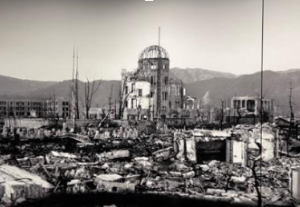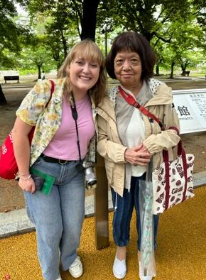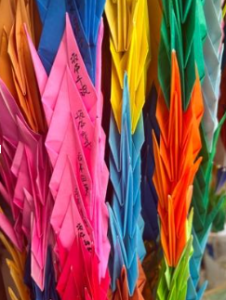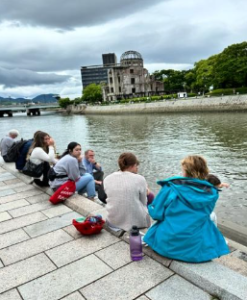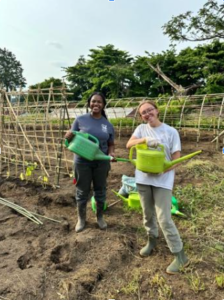 The journey to another culture is not merely a physical voyage; it is a mental and emotional exploration creating a deeper connection with diverse peoples, historical complexities, and pressing social issues. Such global immersion experiences have the power to shape individuals, broaden perspectives, foster empathy, and ignite a passion for positive change. As part of our Leadership Fellows program, our students participate in a global immersion experience when they are in their third year of the program. This year’s cohort recently concluded their immersion trip to Japan, leaving them with memories to last a lifetime.
The journey to another culture is not merely a physical voyage; it is a mental and emotional exploration creating a deeper connection with diverse peoples, historical complexities, and pressing social issues. Such global immersion experiences have the power to shape individuals, broaden perspectives, foster empathy, and ignite a passion for positive change. As part of our Leadership Fellows program, our students participate in a global immersion experience when they are in their third year of the program. This year’s cohort recently concluded their immersion trip to Japan, leaving them with memories to last a lifetime.
As we reflect on the experiences of our students in Japan, it reinforces the fact that these encounters are not just educational outings but life-altering opportunities that mold future leaders with a profound understanding of the world around them. Experience like this would not be possible without partners across the life of the Church. Let me take this opportunity to thank Derek Duncan, Area Executive for East Asia and the Pacific and Fiyori Kidane, People-to-People Coordinator for tireless work and expertise in leading our HELM Fellows. We could not be more grateful to our Common Global Ministries and Week of Compassion for unwavering support as we endeavor to educate Disciples young adults in mission and ministry. Thank you!
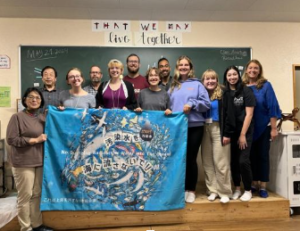 Immersive experiences such as this go beyond textbooks and lectures; they provide a tangible connection to real-world issues, allowing students to witness the impact of their learning firsthand. By engaging with local communities, organizations, and individuals, HELM Fellows gained invaluable insights that cannot be replicated within the confines of a classroom. They learned about the intricate balance between tradition and modernity, the resilience of the human spirit in the face of adversity, and the power of unity in striving for a better future.
Immersive experiences such as this go beyond textbooks and lectures; they provide a tangible connection to real-world issues, allowing students to witness the impact of their learning firsthand. By engaging with local communities, organizations, and individuals, HELM Fellows gained invaluable insights that cannot be replicated within the confines of a classroom. They learned about the intricate balance between tradition and modernity, the resilience of the human spirit in the face of adversity, and the power of unity in striving for a better future.
Key highlights of this learning experience included participation in the Asian Rural Institute focusing on sustainable agriculture. We thank the Director of ARI, Ms. Tomoko Arakawa, ARI Ecumenical Relations, Mr. Jack Lichten and Mr. Ruyipo Vero, Caretaker of Nasu Seminar House. At ARI, students learned about sustainable agriculture in the context of a robust and international community.
Further, we thank Ms. Terumi Kataoka, Director of the Aizu Radiation Information Center (ARIC) and Rev. Hideharu Fuda, Director of the Izumi Project in the Tohoku District who taught us about the Fukushima Nuclear Disaster recovery process. Impactfully, we learned about the continuing 100-year impact of radiation in the soil and water as well as its effects on the environment and the people in this region.
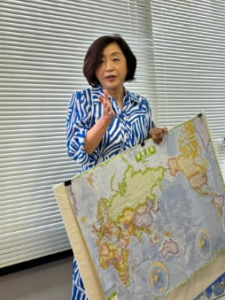 Traveling to Tokyo, our students met with Mr. David Gibson McIntosh, Co-Director of the Center for Minority Issues and Mission (CMIM) as well as Rev. Aminaka Shoko, General Secretary of The United Church of Christ Japan (UUCJ) and Rev. Oshima Kaori, General Secretary of the National Church Council in Japan (NCCJ), both inaugural women in these leadership positions. Additionally, the students had the opportunity to share a meal and discussion with Rev. Jeffrey Mensendiek, Global Ministries Mission Co-Worker and Chaplain at Wasdea University in Tokyo. In each of these conversations, our students gained a deeper sense of the role of religion in promoting social justice, compassion, and human dignity in this context. Experiences and meaningful interactions like this challenge preconceptions opening the door toward new relationships, perspectives, and fostering a sense of empathy and solidarity with individuals whose lives are shaped by different beliefs and values.
Traveling to Tokyo, our students met with Mr. David Gibson McIntosh, Co-Director of the Center for Minority Issues and Mission (CMIM) as well as Rev. Aminaka Shoko, General Secretary of The United Church of Christ Japan (UUCJ) and Rev. Oshima Kaori, General Secretary of the National Church Council in Japan (NCCJ), both inaugural women in these leadership positions. Additionally, the students had the opportunity to share a meal and discussion with Rev. Jeffrey Mensendiek, Global Ministries Mission Co-Worker and Chaplain at Wasdea University in Tokyo. In each of these conversations, our students gained a deeper sense of the role of religion in promoting social justice, compassion, and human dignity in this context. Experiences and meaningful interactions like this challenge preconceptions opening the door toward new relationships, perspectives, and fostering a sense of empathy and solidarity with individuals whose lives are shaped by different beliefs and values.
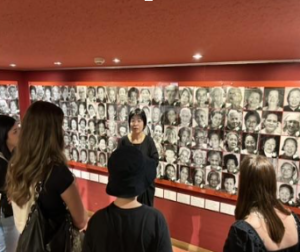 Students also grappled with the painful legacy of the “Comfort Women” visiting the Women’s Active Museum on War and Peace in Tokyo. Through these encounters, they were confronted with the harsh realities of war, exploitation, and human suffering, prompting them to reflect on the importance of remembrance, reconciliation, and advocacy for justice. The impact of these experiences will linger long after they return home, fueling a commitment to honor the memory of the victims and work towards a more just and inclusive society.
Students also grappled with the painful legacy of the “Comfort Women” visiting the Women’s Active Museum on War and Peace in Tokyo. Through these encounters, they were confronted with the harsh realities of war, exploitation, and human suffering, prompting them to reflect on the importance of remembrance, reconciliation, and advocacy for justice. The impact of these experiences will linger long after they return home, fueling a commitment to honor the memory of the victims and work towards a more just and inclusive society.
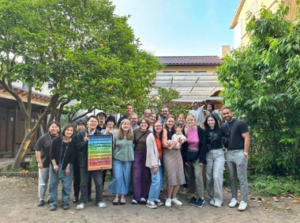 From Tokyo, our students traveled to Kyoto. Visiting the Bazzare Café, Fellows gained an understanding of the active efforts of the church in Kyoto to reach and serve individuals in who struggle from the personal and social challenges of overcoming addiction. By engaging with the staff and patrons of the cafe, the students learned valuable lessons about the strength of human connection, the importance of empathy and compassion, and the potential for positive change when communities come together with a shared purpose. We offer our sincere thanks to Ms. Chie Matsuura, Social Worker at the Bazzare Café as well as Ms. Martha Mensendiek, Global Ministries Co-Worker Associate Professor at Doshisha University for their time and work in preparing for our visit. We also thank Dr. Kanan Kitani, Associate Professor of the History of Christianity in Japan and Mr. Hitoshi Sasaki, a current Graduate Student at Doshisha University School of Theology for arranging time for our students to learn some of this rich history and to engage other college-age students for fun and relationship building.
From Tokyo, our students traveled to Kyoto. Visiting the Bazzare Café, Fellows gained an understanding of the active efforts of the church in Kyoto to reach and serve individuals in who struggle from the personal and social challenges of overcoming addiction. By engaging with the staff and patrons of the cafe, the students learned valuable lessons about the strength of human connection, the importance of empathy and compassion, and the potential for positive change when communities come together with a shared purpose. We offer our sincere thanks to Ms. Chie Matsuura, Social Worker at the Bazzare Café as well as Ms. Martha Mensendiek, Global Ministries Co-Worker Associate Professor at Doshisha University for their time and work in preparing for our visit. We also thank Dr. Kanan Kitani, Associate Professor of the History of Christianity in Japan and Mr. Hitoshi Sasaki, a current Graduate Student at Doshisha University School of Theology for arranging time for our students to learn some of this rich history and to engage other college-age students for fun and relationship building.
A concluding and poignant moment of the journey was the visit to Hiroshima Museum and Peace Park Memorial of 100,000+ Cranes – a sobering reminder of the devastating impact of nuclear warfare and a tribute to the innocent lives lost in the atomic bombing. Standing amidst the solemn monuments and hearing the stories of survivors, the students were humbled by the determination of the human spirit in the face of unimaginable tragedy. This experience instilled in them a sense of urgency to work towards a world free from violence, hatred, and division, inspiring them to become advocates for peace. Particuarly poignant, in this moment, was reframing current conflicts in light of the aftermath of war. The cranes bore witness of voices from around the world calling, no yearning, for peace. We remain grateful to Ms. Miwako Sawada of the Hiroshima Peace and Culture Foundation for guiding us through the memorial grounds and to Rev. Taisaku Obata, Chairman of the General Assembly Western-Chugoku District of the UCCJ for conversation regarding the peace efforts.
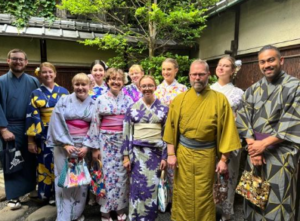 The power of global immersion experiences lies in their ability to transcend boundaries, bridge differences, and cultivate a sense of shared humanity among individuals from diverse backgrounds. By immersing themselves in unfamiliar cultures, confronting difficult issues, and engaging with local communities, HELM Fellows develop a deeper appreciation for the complexity and beauty of the world we live in. These experiences equip students with the skills, knowledge, and empathy needed to navigate an increasingly interconnected and interdependent global landscape, preparing them to become compassionate, ethical, and effective leaders in their respective fields.
The power of global immersion experiences lies in their ability to transcend boundaries, bridge differences, and cultivate a sense of shared humanity among individuals from diverse backgrounds. By immersing themselves in unfamiliar cultures, confronting difficult issues, and engaging with local communities, HELM Fellows develop a deeper appreciation for the complexity and beauty of the world we live in. These experiences equip students with the skills, knowledge, and empathy needed to navigate an increasingly interconnected and interdependent global landscape, preparing them to become compassionate, ethical, and effective leaders in their respective fields.
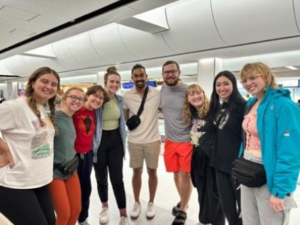 Higher Education & Leadership Ministries remains dedicated to fostering such deep presence and partnership in leadership development, we reaffirm our commitment to providing students with transformative opportunities that enrich their academic pursuits and nurture their personal growth. Global immersion experiences are not an optional add-on to traditional education; they are essential components of a holistic learning journey that empowers individuals to make a positive impact on the world around them.
Higher Education & Leadership Ministries remains dedicated to fostering such deep presence and partnership in leadership development, we reaffirm our commitment to providing students with transformative opportunities that enrich their academic pursuits and nurture their personal growth. Global immersion experiences are not an optional add-on to traditional education; they are essential components of a holistic learning journey that empowers individuals to make a positive impact on the world around them.
Rev. Dr. Tamara Nichols Rodenberg
President, Higher Education & Leadership Ministries

